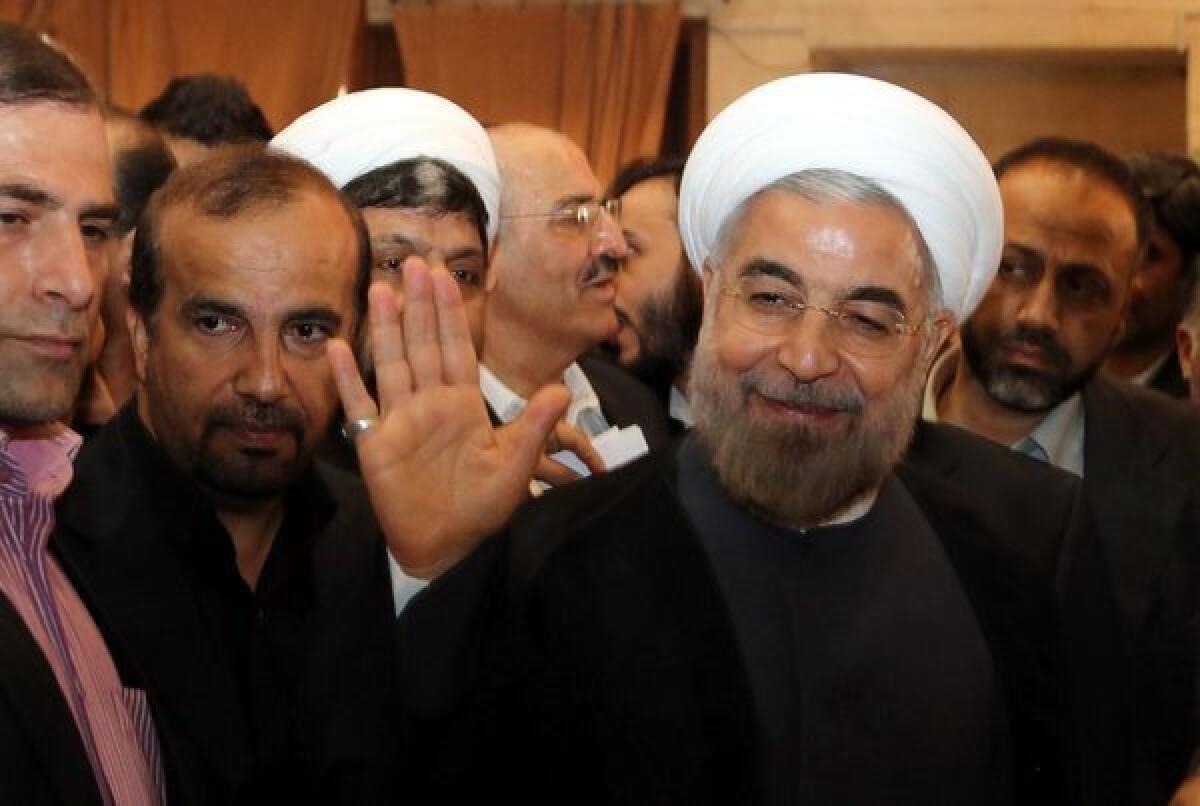Hassan Rowhani, cleric known as a pragmatist, wins Iran election

- Share via
TEHRAN — Hassan Rowhani, who a week ago was viewed as a long-shot candidate, was declared Iran’s next president on Saturday after capturing more than half of the votes cast Friday in national elections.
Rowhani, a 64-year-old cleric with a reputation as a centrist and pragmatist, received 50.7% of the vote, thus winning the presidency without the need for a runoff vote, the Interior Ministry said.
Rowhani received more than three times as many votes as the next runner-up among the six candidates, Tehran Mayor Mohammad Baqer Qalibaf, who won 16.5% of the vote.
A former parliamentarian and longtime mainstay of the Islamic Republic, Rowhani will replace two-term President Mahmoud Ahmadinejad, who was barred by law from seeking a third term.
The election of Rowhani continued a history of surprises in Iranian presidential races. Even his own advisors viewed an outright victory as unlikely, and were hoping that their candidate would have a strong enough showing to force a runoff with Qalibaf or another of the conservative candidates considered close to the nation’s clerical and Republic Guard establishment.
Rowhani, considered a somewhat conservative cleric, reached out to reformist voters on sensitive issues such as personal rights, gender equality and artistic freedom, generating considerable support among women, young voters and the urban middle class. He also vowed to try to open up Iran to the world and end its relative isolation.
The key campaign issue was how to energize the nation’s slumping economy, battered by Western-led sanctions tied to the nation’s controversial nuclear program. Rowhani, a former chief nuclear negotiator with Europe, said he would push for more foreign investment and other job-creation schemes.
In a statement, Iran’s supreme leader, Ayatollah Ali Khamenei, congratulated Rowhani and said the heavy turnout for Friday’s election “nullified plots of ill wishers,” undoubtedly referring to Iran’s archenemies, the United States and Israel. The supreme leader noted that “cooperation and friendship must now replace rivalry,” alluding to some of the barbed comments during the campaign.
In Iran’s theocratic system, the supreme leader holds the ultimate power.
Turnout for the race was an impressive 72.7%, the Interior Ministry said. More than 50 million Iranians were eligible to vote, including 1.6 million first-time voters.
Finishing third and fourth, respectively, were Saeed Jalili (11.3%), Iran’s most recent nuclear negotiator, and Moshen Rezaei (10.5%), a former Republican Guard commander. Jalili, who is considered very close to the supreme leader, had earlier been considered a front-runner, but analysts said he ran a poor campaign that emphasized religious themes and alienated middle-class voters.
The fifth-place finisher was Ali-Akbar Velayati (6.1%), a former foreign minister who was also considered close to the supreme leader but, like Jalili, ended up back in the pack. The sixth finisher was Mohammad Gharazi, former oil minister.
ALSO:
Turkish protesters in park vow to stay put
Hundreds protest in Hong Kong in support of Snowden
Bombings, militant takeover of hospital kill at least 15 in Pakistan
Special correspondent Mostaghim reported from Tehran and Times staff writer McDonnell from Beirut.
More to Read
Sign up for Essential California
The most important California stories and recommendations in your inbox every morning.
You may occasionally receive promotional content from the Los Angeles Times.










